Tamil Nadu: Born as a woman into a Dalit family, Krishnammal Jagannathan had everything going against her in a patriarchal casteist Indian society, but she was resolute in her fight to dismantle feudalism and create a more egalitarian country.
Inspired by Gandhian principles, Jagannathan was a prominent voice protesting against social injustice in her state of Tamil Nadu. She worked tirelessly towards uplifting the condition of the landless and poor people in the southernmost state of the country.
Early Life
Krishnammal Jagannathan was born into a landless Dalit family in 1926 in the Dindigul district of Tamil Nadu. Having lost her father at a very young age, she somehow managed to complete her graduation from the American College at Madurai.
Foray into freedom movement and social work
Having witnessed discrimination, poverty and injustice since her childhood owing to her lineage and gender, Jagannathan felt drawn towards social work.
Her first experience of injustice was when she saw her mother work very hard during the advance stage of pregnancy. Her mother’s condition inspired her to work towards bringing social equality in society.
After completing her education, she joined the Gandhian Sarvodaya Movement, where she had the opportunity to meet Mahatma Gandhi, apart from her husband Sankaralingam Jagannathan, a social activist himself.
Together, the couple participated in the Non-Cooperation Movement, the Civil Disobedience and Quit India Movement led by Gandhi himself.
Land redistribution
But it was during Vinoba Bhave's Gramdan movement that the activist duo started working towards land redistribution.
Jagannathan successfully distributed nearly 40 lakh acres of land to the landless poor through the Bhoodan movement or Land Gift Movement which was a voluntary land reform movement in India initiated by Vinoba Bhave in 1951 at Pochampally village, which is now in Telangana.
The massacre of 1968, in which 44 Dalit women and children were burnt alive during a dispute over their wages in Keezhvenmani village of Tamil Nadu's in Nagapattinam district, led Jagannathan to set up her base in the southern state to focus on reforming land rights issue.
She, along with her husband, founded Land for Tillers' Freedom (LAFTI) in 1981 and brought landlords and the landless people on a negotiating table to help landless people buy land at a reasonable price.
Also read: Coronavirus: Iran rejects reports of deportation of Indians
The movement was a success and she transferred nearly 13,000 acres of land to about 13,000 families.
Awards and accolades
Acknowledging her contributions to society, Krishnammal has received countless awards, including
- Swami Pranavananda Peace Award in 1987
- Jamnalal Bajaj Award
- Padma Shri in 1989
- Bhagavan Mahaveer Award for propagating non-violence in 1996
- Summit Foundation Award in Switzerland in 1999
- Opus Prize’ by the University of Seattle in 2008, and
- Padma Bhushan in 2020, among others
Despite being a 94-year-old, the social reformer continues to fight for the rights of the downtrodden and marginalised. Jagannathan now aims to construct 5,000 houses for those who were affected by the 2019 cyclone and start a movement against the sale of liquor by mobilising women in the state.




